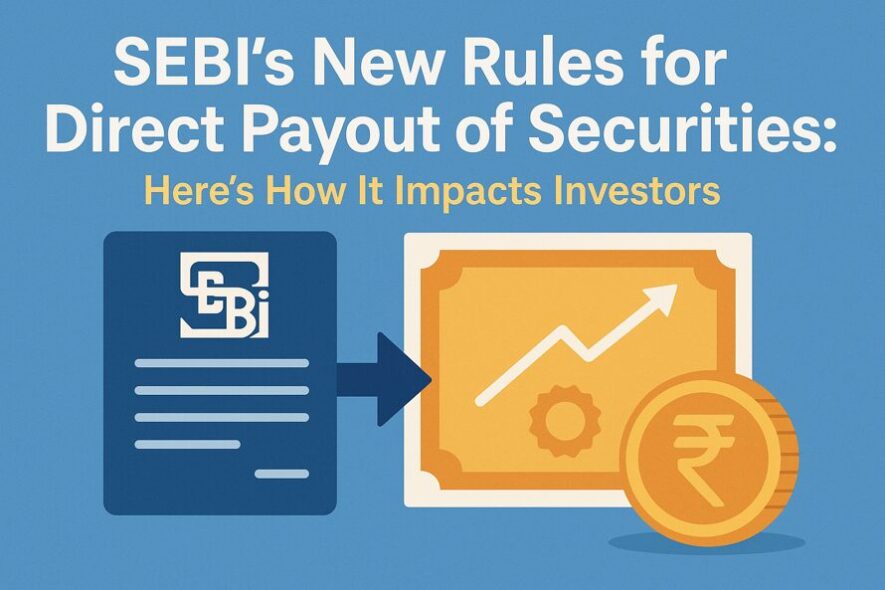SEBI’s New Rules for Direct Payout of Securities: Here’s How It Impacts Investors

Understanding SEBI’s Recent Mandate
Market regulator Securities and Exchange Board of India (SEBI) closely monitors the way India’s markets function and introduces changes as deemed necessary. Some changes are technical, barely noticed by retail investors. Others change the very experience of investing. The new mandate on Direct Payout of Securities falls squarely into the second category.
Until now, most investors believed that once they bought a stock, it instantly became theirs. In reality, the process was more layered. Clearing corporations transferred securities to broker pool accounts, and only later did brokers credit them into client demat accounts. It worked most of the time, but it wasn’t foolproof.
The new rule cuts through the noise. Starting January 2025, clearing corporations will directly credit securities into investor demat accounts, skipping the broker pool stage entirely. That’s a big deal because the flow of ownership becomes simpler, safer, and faster.
What Is “Direct Payout of Securities”?
Think of direct payout as receiving your salary straight to your bank account instead of through your office accountant, who might be processing it. With SEBI’s rule, securities now travel directly from the clearing corporation to NSDL/CDSL and into your demat account. No stopovers. No detours.
When Do the New Rules Come into Effect?
Phase 1 commenced on October 14, 2024, covering equity cash and physical settlements. The second phase, involving all security transactions, including Securities Lending and Borrowing and Offer for Sale, began on January 14, 2025. For retail investors, the transition will feel invisible; you’ll simply notice that shares arrive in your account directly.
Why SEBI Introduced Direct Payout Rules
Every regulatory move has a backstory. Direct payout is SEBI’s response to long-standing cracks in the old system.
Preventing Misuse of Investor Assets
Broker pool accounts were meant to be temporary parking lots. However, history shows that in some cases, brokers have used these securities for purposes beyond settlement, such as pledging them, lending them, or mixing them with other accounts. While SEBI already tightened rules after the Karvy episode in 2019, the complete elimination of the pool stage ensures such misuse doesn’t occur again.
Enhancing Transparency in Securities Settlement
Under the old system, many investors had no real-time clarity on when their purchased shares were actually credited. If a broker delayed crediting shares, investors often remained in the dark. Direct payout fixes that. Once the trade settles, securities hit the demat account directly, and investors can view them without relying on broker communication.
Strengthening Investor Protection
This is at the heart of the rule. By making settlement investor-centric rather than broker-centric, SEBI strengthens market trust. It reassures retail investors, domestic institutions, and foreign players that India’s market infrastructure is built to protect ownership integrity at all times.
Key Changes under the New SEBI Framework
The new rules aren’t cosmetic; they overhaul the very workflow of how securities change hands.
Dematerialized Payout via Depositories
Securities will now move directly from clearing corporations to depositories. NSDL and CDSL will then credit them into the investor’s demat account. This direct highway replaces the older model where brokers acted as middle custodians.
Role of Brokers and Clearing Members
Brokers won’t vanish from the equation. They still play a key role in trade execution, client communication, and ensuring settlement instructions are correctly mapped. But their role shrinks in custody. They’re now facilitators, not holders. This reduces their risk but also nudges them to invest in compliance and IT systems.
Time-bound Settlement & Reporting Requirements
The framework also strengthens T+1 settlement timelines. Securities must be reflected in demat accounts within the prescribed window. Clearing members must file detailed reports confirming compliance, and any delays will attract penalties.
How the Rules Impact Individual Investors
From an investor’s perspective, direct payout simplifies life in three significant ways.
Easier Tracking of Securities Transfers
Earlier, many investors saw a gap between buying shares and viewing them in their demat account, making them anxious. Now, tracking becomes straightforward: purchase today, and see the shares in your demat by the next day, directly credited by the clearing corporation.
Reduced Risk of ’Unauthorized Lending’ of Shares
Some brokers quietly lent client securities to generate extra revenue. Investors rarely knew their shares were being used elsewhere. Direct payout eliminates this layer of risk. Shares belong to you and sit only in your account, immune to broker misuse.
Enhanced Assurance on Share Allotments & Corporate Actions
Corporate actions like IPO allotments, bonus issues, or rights entitlements will also flow directly to investor demat accounts. That means less room for delays, miscommunication, or mismatches. For investors who worried about “missing” corporate credits, this rule provides strong assurance.
Impact on Brokers, Clearing Corporations & Depositories
While investors celebrate, intermediaries are busy recalibrating.
Responsibilities of Brokers & Clearing Members
Brokers must adapt to a new role: no longer custodians, but facilitators. Their job now is to ensure accurate investor details and smooth execution so securities can flow directly. This requires tighter integration between back offices and exchanges and depositories.
Technical and Compliance Upgrades
Clearing corporations and depositories are investing in IT upgrades and automation. Systems must handle direct mapping of millions of trades daily without error. Any mismatch can disrupt settlement, so robust reconciliation is critical.
Costs & Operational Changes
Smaller brokers may feel stretched by compliance costs, upgrading software, training staff, and ensuring timely reporting. Larger players, however, may see this as an opportunity to showcase efficiency and win client trust.
Process Flow for Direct Payout under New Rules
The best way to grasp the new system is to visualize the journey of a trade.
What Investors Need to Do
Surprisingly, investors don’t need to lift a finger. As long as your demat account is active and linked correctly, the system handles the rest. You’ll simply notice faster, more direct credits.
How Brokers Must Process Transactions
Brokers ensure that every client’s demat account is correctly mapped in the trade. They must pass accurate details to clearing members so securities land in the right place instantly.
Timeline from Trade Execution to Securities Credit
Here’s how it flows: Trade executed on Day T → Settlement by clearing corporation → Direct credit to NSDL/CDSL → Shares in investor demat by Day T+1. No detours, no waiting for broker transfers.
Comparison: Old vs New Settlement Framework
The change becomes clearer when you compare before and after.
Before: Indirect Payout via Broker Pools
Under the old model, securities first went to broker pool accounts. Brokers then distributed them to clients. This created a gap where misuse or delays could occur, and investors had little visibility.
After: Direct Credit to Demat Accounts
With direct payout, the middle stop vanishes. Clearing corporations transfer securities straight to depositories, which credit them into investor demat accounts. Investors gain ownership more quickly and with greater certainty.
Benefits and Potential Challenges
Like any regulatory shift, this one has two sides.
Pros: Safety, Control & Faster Reconciliation
- Investors gain direct control and clear ownership.
- Transparency improves, as securities appear in demat accounts without delay.
- Faster reconciliation reduces disputes and builds trust in markets.
Cons: Implementation Teething Issues
The transition won’t be seamless. Smaller brokers may face cost pressures. IT systems could face early glitches, especially on high-volume days. But most of these are short-term growing pains rather than structural flaws.
Conclusion
SEBI’s mandate on direct payout of securities is a landmark reform. For investors, it means peace of mind, faster credits, and protection from misuse. For brokers and clearing houses, it means upgrading systems, shifting roles, and adapting to a more transparent framework.
Over time, this change will enhance India’s reputation as a secure, investor-friendly market. By making ownership flow directly into demat accounts, SEBI is sending a clear message: in India’s securities market, investors come first.
FAQs:
Q. What if my broker fails to credit securities on time?
Under the new framework, the broker’s role in crediting shares largely disappears. Clearing corporations now send securities directly to your demat account via NSDL or CDSL. If you ever notice a delay, the issue would be with the depository or clearing side rather than your broker. Still, you can raise a query with your broker as the first point of contact, and they will escalate it for quick resolution.
Q. Do I need to take any action to receive a direct payout?
As an investor, you don’t need to file forms or opt in. The process is automatic. Once the rule goes live, every trade you execute will settle directly into your demat account. The only step for you is to make sure your demat account is active and properly linked with your trading account. From there, the system takes care of the rest.
Q. How will corporate actions (like dividends) be impacted?
Corporate actions such as dividends, bonuses, and rights issues already flow through depositories. With direct payout, this process becomes even smoother, since securities bypass broker pools and directly reach your demat. For investors, this means fewer delays in receiving corporate credits, better visibility in statements, and less dependency on intermediaries for updates.
Q. Is there any extra cost for investors due to this rule?
No additional cost is passed on to investors. Clearing corporations, depositories, and brokers absorb the system upgrade expenses. Your usual brokerage, exchange charges, and depository fees remain the same. Direct payout reduces the hidden risks that once carried indirect costs for investors.
Disclaimer
The stocks mentioned in this article are not recommendations. Please conduct your own research and due diligence before investing. Investment in securities market are subject to market risks, read all the related documents carefully before investing. Please read the Risk Disclosure documents carefully before investing in Equity Shares, Derivatives, Mutual fund, and/or other instruments traded on the Stock Exchanges. As investments are subject to market risks and price fluctuation risk, there is no assurance or guarantee that the investment objectives shall be achieved. Lemonn (Formerly known as NU Investors Technologies Pvt. Ltd) do not guarantee any assured returns on any investments. Past performance of securities/instruments is not indicative of their future performance.







